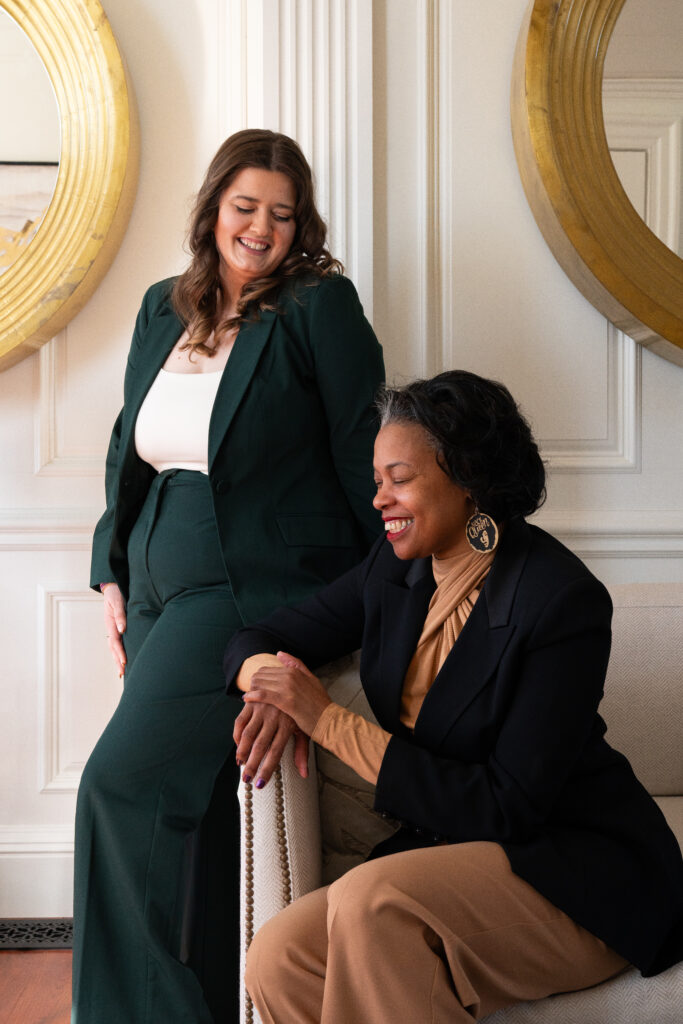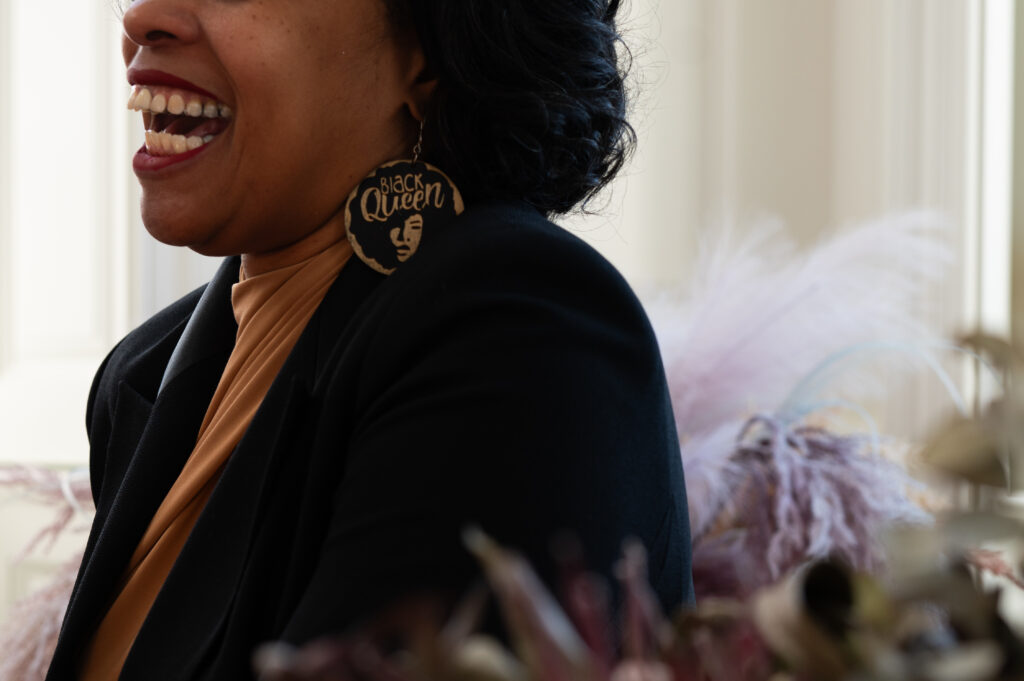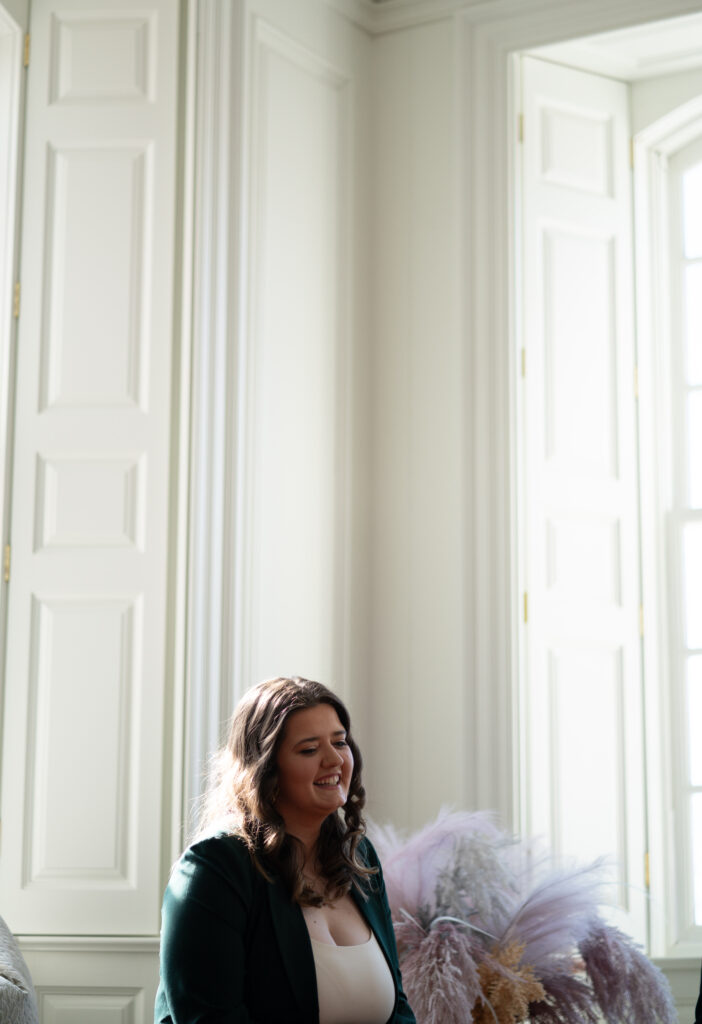Tameka Randle and Rachael Long work together daily with residents of South Cape and other partners and volunteers to transform the South Cape neighborhood through education, housing and wellness initiatives, using the Purpose Built Community model. Tameka works as the executive director of People Organized to Revitalize Community Healing (PORCH) and serves on the Missouri Housing Development Commission, as well as on the Cape Girardeau City Council as an elected official; Rachael works as the PORCH community initiatives manager.
As the two full-time employees of PORCH, Tameka says their energies and strengths complement each other well, and they’re always working to help each other through their weaknesses.
“We’re doers. And that’s who I like to surround myself with,” Tameka says. “[Rachael’s] a doer, she’s a thinker. She excels in so many areas: nonprofit work, exploring and grant writing work, being a realtor, being a business owner. So, every facet of what we do with PORCH, she has some level of experience or expertise in it.”
Rachael, who previously volunteered with PORCH and began paid work with the organization Jan. 1, says Tameka has become a mentor to her.
“Something I really admire, Tameka, about you, is that when you walk into a room, every single conversation stops. You just command the presence of every room that you walk into,” Rachael says. “The way that you carry that, you also make the people around you feel seen and uplifted, and a lot of people don’t do that.”
Here, Rachael and Tameka reflect on where they’ve been in their personal careers and where they’re headed as an organization. This conversation has been edited for length and clarity.
Rachael Long: So, one of the things that we sometimes talk about is [you’ll] be like, “When I was your age, I was doing this and that and this — you don’t need to be doing all of that.” So, one thing I want to ask is, when you think back to when you were my age in your career, what are some things that you wish you had known that you know now?
Tameka Randle: Boundaries. So most of the time, I’m a doer, I like to work, so if anybody asks me something, I’ll be like, “Yes, yes, yes, I’ll do it.” And so, I think I said yes to everything before I turned 30. As I got older, I almost think since you’re seasoned, you come experienced, you can decide what you gonna say yes or no to. And I’m not the type of person to live in regret; I just learn. And so, I think it’s important, which I do share with [you], boundaries. Just ‘cause somebody asks you, or even I ask you, so sometimes I ask [you] to do things professionally, but it’s outside the scope of PORCH, but I say, “You’re not obligated, don’t feel like you have to do it, but if you want to be a part of this or you want to network, I’ll connect you to it.” Allow [you] to do that. But then, it won’t hurt if [you say] no, it won’t go against [you] with [the] organization or things like that, it’s just personal growth or opportunities to be connected or involved. So a couple things I think is important: And as you get older, education is very important. Knowledge is important, and networking is, too. And so, you can really go far if you’re knowledgeable and if you are able to network. Which I did a lot of that, but now, I’m intentional. So, I don’t just attend just to attend, but is this a meeting that will advance the agenda of serving people or our community or our city?
Yeah, so much of the work we do is based in relationships, relationship building. A lot of the things we’ve done with our [community members’ housing] renovations have been because of relationships that already existed with our contractors, and it really all is about how you connect with people and how you treat them, I think.
Very important. We helped our second family purchase their first home, and [the homebuyer] shared with me that she appreciate what we’ve done to help her, and she said many times, people who have assisted her made her and her family feel like dirt, and I mean, you know, your heart just drop. People’s perception is their reality, whether you agree with it or not — I’m very conscious of that. And I’m very sensitive about the people we serve, making sure they not exploited.
So again, something I admire, the openness that you have toward people. I’m wondering, to be in this kind of work where you’re serving people, what was it or who was it that initially created that passion for you, that lit your fire?
So I was a athlete in high school. I got a basketball scholarship to Eastern Michigan University, but I had a track coach that helped so many young people get scholarships. I’m talking about D1 scholarships — we ran at state levels, we was All-State all four years, I ran in the nationals, and one thing he was saying, “I’m going to help you get out, I’m going to help you make it out.” And so, my sister always repeat that. I say, “I’m going to help them, ‘cause he helped me.”
But my family are educators. I got a lot of teachers and administrators and principals, and my undergraduate education and public administration is my graduate degree, so I think I always got a heart — the early part of my career is young people. I think I’ll go back to that later, like the little ones about five or six — I can see me working with them on the downhill, working in a daycare or something like that, you know, part-time.
Yeah, being around children is nice.
Oh, yeah. It brings me another type of joy. Mhmm.
So with that in mind, another question I had for you was about the seasons of your life you’ve already been through and how you look ahead. When you think about the younger generation, what do you hope for them?
A work ethic. You know, you have to have a work ethic. You have to have a good attitude, and you have to be willing. Whether that’s willing to do the work, willing to partner, you have to show a willingness. So, I think those are some very valuable things for younger generations and older generations. ‘Cause I’ve lived by that. People respect you when you work. I don’t care if you work at Mcdonald’s the last 10 years or we work in nonprofit or you’re in corporate America, I think people respect people that try to earn a living. If they’re able to. Now, there are people that haven’t, but they may volunteer their time and have the same type of values but maybe not for monetary gain, based off their circumstances. So it just depends.
So, what are some of your aspirations or goals, if you could name one that you want to focus on, you’ve been thinking about? And it may change, ‘cause mine have changed over the years.
Yeah. That’s always been a hard question for me to answer. I think my passion has always really just been I want to make the world a better place, and I want to be someone that when people interact with me, they leave better. They leave with that experience either served in some way or like I gave them a good piece of advice or just I was a person that they felt safe around. So, it’s a hard question for me to answer, because I’ve never really had the clearest sense of “When I grow up, I’m going to be this one type of professional.”
Me, either. Me, either.
I’ve just always had a sense, like I want to serve people. And so, I think it’s a good fit to be in nonprofit with that.
And even though our exterior look different, we are so much of the same, so I feel the same way you do, and I’m driven by my core values and what I believe in. So, my personal philosophy is serving people. So, I’m an elected official. They asked me, “Why did you decide to run?” I’m running for people. It’s about people, it’s not about a party, it’s not about a special interest group, and I treat everybody as an individual as they come to me for that, I don’t put everything in the box. I’m not a in-box person. I’m kind of an outside-box type of thinker, and I operate that way. If I had to operate inside a box, I don’t do as well. I look at it, if you need that, I can’t do cookie-cutter.
Which is good. I mean, the work that we do, some of it, we’re creating a blueprint literally as we do it. And so, you need somebody who can think creatively and think in a systems approach. And I think we do that pretty well.
Mhmm. And we focus on the system holistic approach for families and housing, and we assist them with wellness, and we make sure they’re educated through the process. So, education and knowledge is most important, so we make sure when we serving people that the efforts that we make is sustainable for their living if we’re no longer here. You’re successful when people are not there, the program not there, but the product with people that you serve can continue on. Educating them on whatever aspect that is, on our initiatives, and making sure they understand process. People see something but don’t know the steps, don’t know how to figure it out, so we make sure no matter what it is, we make sure we help people through the process. So, that’s important to me. Very important.
Yeah, I think we work together well because we take a similar approach toward people. And I love learning from you and seeing the way you move — I think that has helped me be even more strong in that area. It’s just all about people and being good to them, I think.
I need to ask this question, ‘cause I’m an impromptu person. So yesterday, it was like, “Oh, Tameka, we want to interview you about your open house on Saturday.” I was like “OK, great. Rachael, your turn.” [You’re] like, “Oh, when do they want to do it, in a few days?” I was like, “No, today. They want to do it today. Rachael, I’m going to need you to do this.” So, it’s been a few times, I could tell [you were] like, “Well, I wish I was prepared,” but the best times is when you’re not prepared, and it’s how you continue to move on in this world and in this line of work, so many things change all day. So I was wondering, how do you feel about when I put you on the spot sometimes, and then, how you transitioning with that?
I came on thinking, “OK, I am such a good No. 2.” I love to support the work of the person who is out in front. But I don’t love being out in front. That’s why I went initially into newspaper journalism, because you get to be sort of behind-the-scenes. So it’s an adjustment, and I think when you ask me, there is initially a moment of fear, and then I’m like, “OK, we’ve got this. We can do this.” And so, I think the more I do it, the more it comes naturally.
[We] work through the questions and answer. So just make sure [you feel] supported. Not like “Here you go, have the interview.”
One thing I learned — you mentioned [Southeast Missouri State University Mass Media Department Chair] Dr. [Tamara Zellars] Buck is a mentor of mine, and one thing I learned when I was her student is that some people lead from behind. Not everybody leads from out front, and I think that really is kind of my strength, that’s kind of where I find I’m best-suited.
[You] can do both extremely well.
Yeah, yeah, OK. But I really feel that a supporting role is something that I’m strong in, and I am building the other side. And so, [you’ve] been really helpful to me professionally, but also personally, just figuring out where I feel comfortable and how to be better at that. So, I’m good with that. … In this season that you’re in now, what excites you the most?
Actually, I would have to say our volunteers that’s on our board and our volunteers on our committee. I mean, I think they put as many man hours that we get paid to do and do it with a big heart and grateful. With our housing initiative, it encompassed so much … You can have a vision, but if you don’t have the people to believe in the vision or have the expertise, it can’t be carried out. … I’ve taken myself back to grassroots that I did when I was like in my 20s, you know, and you have to know how to work with people. And so especially the people that we going to make sure we’re working with, you have to be special and sensitive to that.
I mean, when you have a vision and you have our volunteers who are excited and who want to show up and help to carry that vision forward, it is exciting.
And they excited about it. So, one thing I try to do is that I try to find what people passionate and interested in, and you’re only going to ask people one or two things at the most — it depends on the person — but you ask them for that one thing that they love to do and are passionate about doing and have the skill set to do it, they’ll run with it. … The synergy we’re gaining and the support is very nice. But the work we’re doing hasn’t been done before by an organization. Developers, contractors, government, but not by a nonprofit organization in this community. So I take pride in that.
What kind of aspirations do you have for the future?
I do want to be able to ease my way out of grassroots; I just feel like I’m getting older, but I want to be able to advance in some political or policies to continue to help people, but more at the state level, national level that can kind of [filter] change. And so, I’ll be sitting at more tables than doing sledgehammers … but what I value [as] the most important is that I have an understanding of the work. So, I can speak from both sides.
And you already serve on state boards that allow you to work in a bigger capacity, so it’s like taking the same approach, but being able to help more people at once.
I always like people that want to get involved, I always kind of keep them informed about different cities and nonprofits and state-level opportunities, you know, so we can have representation from many people and many places. So, I think that’s important, mhmm.
I love working with you, because it doesn’t feel like work. … You do have such a strong vision for South Cape, it helps the rest of us see the path forward. So, I love that. We love hanging out.
That’s the energy we have, you know. Our energy is like this all the time. So, it’s just a different type of energy, but it’s the same synergy of going in the same direction.




